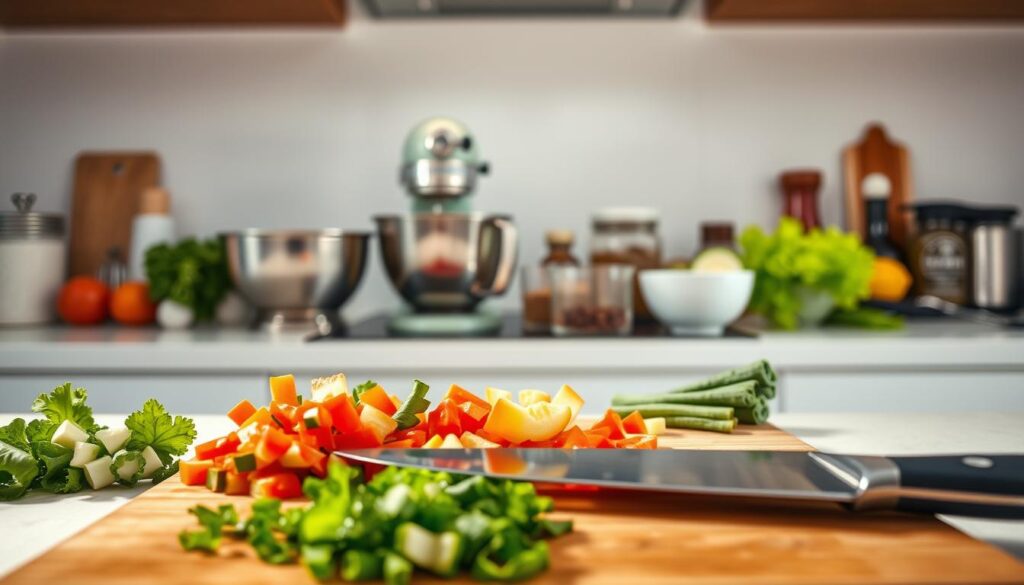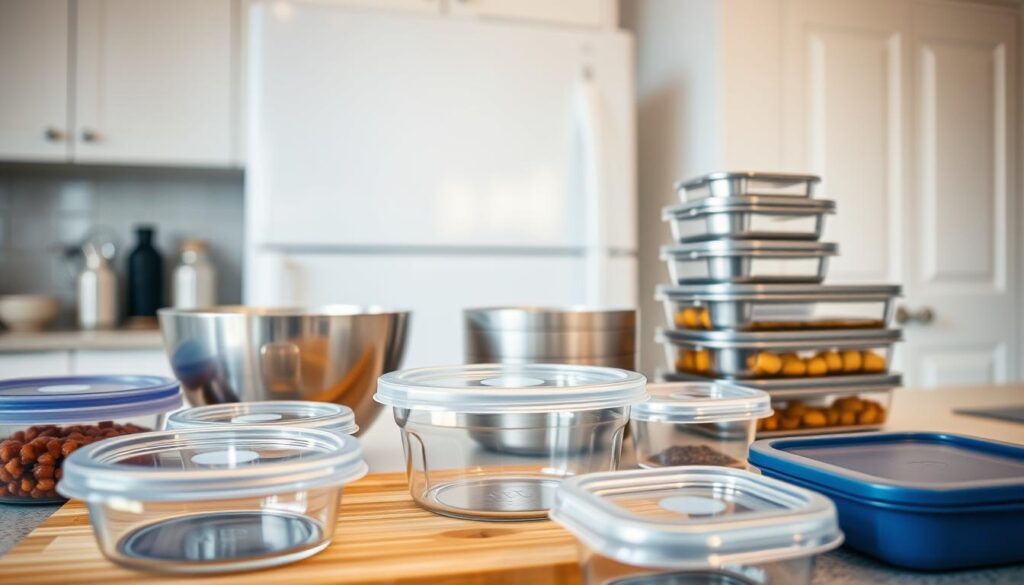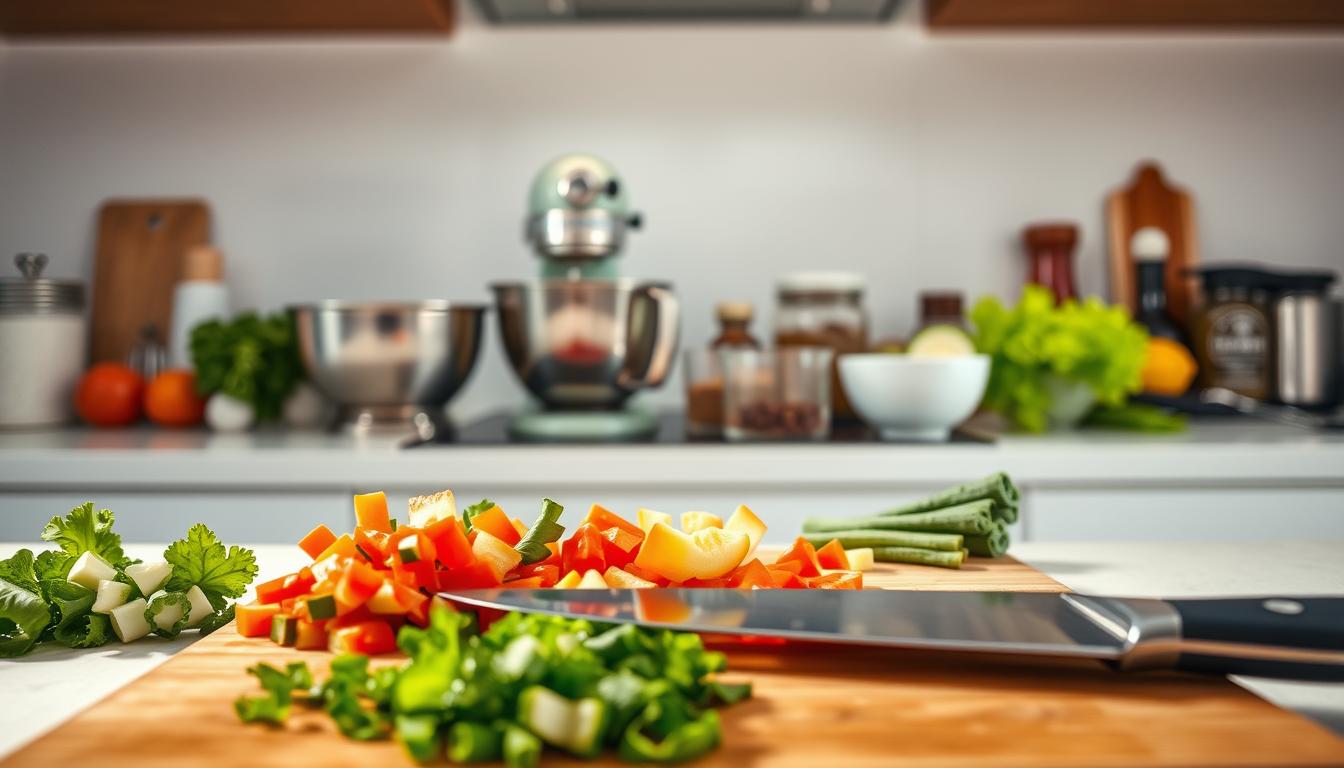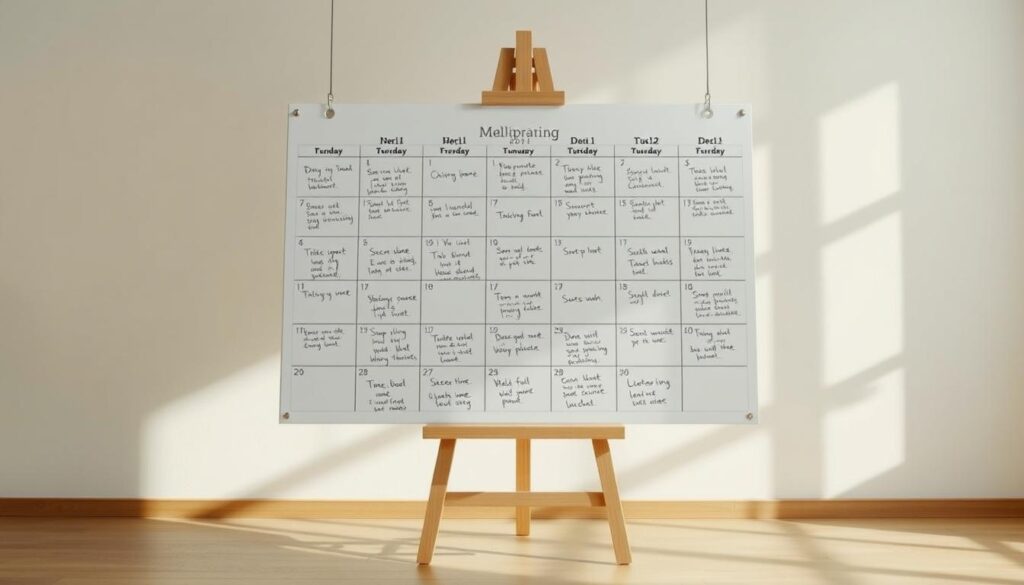7 Foolproof Meal Prep Tips for a Healthier You

Are you tired of daily cooking stress and constant food decisions? What if you could transform your kitchen routine and reclaim hours of your week while eating healthier?
Meal preparation isn’t just a trend – it’s a lifestyle strategy. It can change how you approach nutrition. With just 1 hour of planning per week, you can reduce stress and ensure healthier eating habits throughout your busy schedule.
Implementing effective meal-preparation-tips can save up to 50% of your cooking time. Easy meal planning isn’t about perfection. It’s about creating sustainable strategies that work for your lifestyle and nutrition goals.
Key Takeaways
- Meal prep can dramatically reduce daily cooking stress
- Save significant time and money through strategic planning
- Improve nutritional intake with prepared meals
- Reduce food waste through intentional cooking
- Create sustainable eating habits with minimal weekly effort
Understanding the Benefits of Meal Preparation
Meal preparation is more than a kitchen trend. It’s a way to improve your health, save money, and change your lifestyle. By following smart meal prep tips, you can enjoy many benefits that go beyond just cooking.
Time-saving meal prep strategies offer many advantages. They can make your daily life much better. Studies show that planning meals leads to positive changes in many areas of wellness.
Saving Money and Time
Meal prepping can cut food costs by up to 50%. It helps by reducing the need to eat out. The main financial benefits are:
- Less impulse buying of food
- Buying ingredients in bulk
- Less food waste
- Spending less on restaurants
Eating Healthier Meals
Home cooking offers many health benefits. Studies show that meal preppers eat:
- 1.5 more servings of fruits and veggies daily
- Less calories than restaurant meals
- More controlled portions
- Lower risk of chronic diseases
Reducing Food Waste
Meal prep can also cut down on food waste. It’s found that meal preppers waste about 20% less food. This is due to better planning and portion control.
60% of meal preppers feel less stressed about food choices during the week.
By starting meal prep, you’re not just cooking. You’re investing in your health, saving money, and building a better relationship with food.
Essential Tools for Successful Meal Prep
Turning your kitchen into a meal prep hub needs the right tools. These tools make meal prep quick and fun. They help you save time and enjoy cooking more.
Getting quality kitchen gadgets is key for better meal prep. These tools save time and make meal prep easy for everyone. They’re perfect for home cooks of all levels.
Must-Have Kitchen Gadgets for Meal Preparation
- Digital Kitchen Scale: Average cost around $40, helps with precise ingredient measurements
- Multi-Cooker (Instant Pot): Priced between $100-$150, offers multiple cooking functions
- Food Processor: Cuisinart 14-cup model around $200, perfect for quick chopping and mixing
- Quality Chef’s Knife: Range of $27-$50, essential for efficient ingredient preparation
Smart Storage Solutions
Keeping food fresh and preventing waste is key. Here are some storage ideas:
- Rubbermaid Brilliance Containers: $25-$55, leak-proof and microwave-safe
- Pyrex Glass Containers: Microwave-, oven-, and freezer-safe
- Beeswax Food Wraps: Eco-friendly alternative at around $19
- Vacuum Sealers: $100-$250 for long-term food preservation
Using these meal prep hacks and strategies will change your kitchen. It will become a place of productivity, saving you time and stress. It will also help you eat healthier.
Choosing the Right Recipes
Meal prepping starts with picking recipes that taste good and are easy to make. It’s important to know what you need nutritionally and what you’re good at cooking. Beginners should look for simple recipes that are easy to make and store.
When looking for meal prep tips, remember these important points for choosing recipes:
- Choose recipes with overlapping ingredients to save money
- Go for dishes that can be made in big batches
- Look for recipes that are balanced nutritionally
- Choose meals that are tasty as leftovers
Meal Ideas for Beginners
Begin with easy, flexible recipes that don’t need a lot of cooking skills. Good options for beginners include:
- Overnight oats with different toppings
- Grilled chicken with roasted veggies
- Mason jar salads
- Slow cooker stews and chilis
Balancing Nutrition in Your Meals
It’s key to make meals that are balanced for meal prep success. Try to include proteins, complex carbs, and healthy fats in each dish. Studies show that mixing 70-80% familiar recipes with 20-30% new ones keeps cooking exciting and consistent.
Pro tip: Try one new recipe each week to avoid meal prep boredom and grow your cooking skills.
By using these meal prep tips, you’ll find a way to eat healthy that saves time, reduces stress, and meets your nutritional needs.
Creating a Meal Prep Schedule
Mastering easy meal planning starts with a plan that fits your life. A good schedule is flexible and realistic. It should work with your daily routine.
Many people choose Sunday for meal prep. It helps you start the week with healthy meals. This saves time and reduces stress.
Weekly Planning Strategies
Effective meal prep scheduling involves several key strategies:
- Choose a consistent prep day (typically Sunday or Wednesday)
- Plan for 3-7 days of meals in advance
- Start with preparing one meal time (breakfast, lunch, or dinner)
- Use a meal planning app to track recipes and shopping lists
Setting Realistic Goals
When starting meal prep, start small. Gradually build your skills and confidence by following these guidelines:
- Begin by prepping one or two meals per week
- Invest in quality storage containers
- Prep easy ingredients like boiled eggs and chopped vegetables
- Adjust quantities week by week to minimize food waste
“Meal prepping is not about perfection, but about making consistent progress toward healthier eating habits.”
Meal prep can save you 30 minutes to two hours each week. By sticking to a schedule and setting realistic goals, you’ll change how you cook and eat.
Preparing Ingredients in Advance
Time-saving meal prep means working smarter, not harder. It changes your cooking routine and makes healthy eating easier. Preparing ingredients ahead of time makes meal prep faster and less stressful.
Batch cooking and preparing ingredients are big wins for busy cooks. They save a lot of time and ensure you always have healthy meals ready.
Batch Cooking Strategies
Batch cooking lets you make big batches of key ingredients. These can be mixed and matched all week. Here are some top strategies:
- Cook multiple protein sources like chicken, beans, and fish
- Prepare whole grains such as quinoa, rice, and barley
- Roast a variety of vegetables for quick meal assembly
Pre-Cutting Fruits and Vegetables
Pre-cutting produce saves a lot of time. It cuts down your daily cooking time a lot. Here are some tips for storing them:
| Ingredient | Refrigerator Storage Time |
|---|---|
| Chopped Vegetables | Up to 1 week |
| Hard-Boiled Eggs | Up to 1 week |
| Cut Fruits | 2-3 days |
Pro tip: Use airtight containers and store prepped ingredients in the coldest part of your refrigerator to maximize freshness.
Using these meal prep tips makes your kitchen more organized. It also cuts down on cooking stress. Start small, try different methods, and find what fits your life best.
Storing Meal Preps Safely
Mastering meal prep hacks means understanding the critical role of proper food storage. Keeping your prepared meals fresh and safe requires strategic planning and the right techniques.

Food safety is paramount when storing meal preps. The recommended refrigerator temperature ranges between 35°F and 38°F. This helps prevent bacterial growth and maintains food quality.
Refrigeration Best Practices
Implementing meal prep tips and tricks for refrigeration can significantly extend your food’s shelf life:
- Store cooked meals within 2 hours of preparation
- Use airtight containers to prevent moisture and contamination
- Follow the First-In, First-Out (FIFO) system to reduce food waste
- Keep different food types separate to prevent cross-contamination
Freezing for Long-Term Storage
Freezing is an excellent strategy for preserving meal preps beyond a few days. The optimal freezer temperature is 0°F (-18°C). This effectively halts bacterial growth.
“Proper food storage can reduce the risk of foodborne illnesses by preventing bacterial development.” – Food Safety Experts
Different foods have varying freezer lifespans. For instance, lunch meats can last up to a month. Seafood like squid can remain frozen for up to 18 months.
| Food Type | Refrigerator Shelf Life | Freezer Shelf Life |
|---|---|---|
| Chicken and Rice | 5 days | 4-6 months |
| Soups and Stews | 4 days | 4-6 months |
| Salads | 3 days | Not recommended |
Remember, when reheating stored meals, always bring the internal temperature to 165°F. This eliminates potential bacteria. By following these meal prep hacks, you’ll ensure your prepared meals remain delicious and safe to consume.
Making the Most of Your Grocery List
Grocery shopping can change the game for meal prep. Smart strategies save money, cut down on waste, and make healthy meals easy. Planning ahead makes your grocery trip efficient and affordable.
Good meal prep starts with a smart grocery list. Studies show shopping with a list can cut impulse buys by up to 20%. Planning helps you stick to what you need, avoiding extra costs.
Smart Shopping Tips for Meal Prep
- Create a detailed grocery list before shopping
- Shop after eating to reduce impulse buying
- Buy ingredients that can be used in multiple recipes
- Check store sales and plan meals around discounts
- Purchase versatile staples like whole grains and legumes
Embracing Seasonal Ingredients
Seasonal ingredients are key in meal prep. Choosing produce at its peak has many benefits:
- Lower prices during abundant harvest times
- Better flavor and nutritional value
- Support local farmers and agriculture
- More variety in your meal preparation
For example, summer has zucchini, cucumbers, and berries. Winter brings root veggies and citrus. Using seasonal ingredients makes your meals diverse and budget-friendly.
Cooking Techniques that Save Time
Time-saving meal prep needs smart cooking strategies. These methods make your kitchen work more efficient. They help you cook delicious meals with less effort.
Modern cooks are finding ways to make meal prep faster. By using smart cooking techniques, you can save a lot of time. You still get to enjoy high-quality meals.
One-Pot Meals for Maximum Efficiency
One-pot meals are great for those who are always busy. They offer many benefits:
- Minimal cleanup required
- Reduced cooking time
- Simple preparation process
- Versatile recipe options
Utilizing Slow Cookers and Instant Pots
Slow cookers and Instant Pots are key for efficient meal prep. They change cooking by:
- Preparing meals with minimal active cooking time
- Creating multiple servings at once
- Allowing hands-off cooking
- Keeping nutrients while adding rich flavors
Pro Tip: For example, cooking shredded chicken in a crock pot takes 4-5 hours. It gives you enough meat for salads, burritos, and sandwiches.
Smart cooking is about working smarter, not harder in the kitchen.
By using these time-saving techniques, you can enjoy tasty, healthy meals. You won’t have to spend hours in the kitchen.
Staying Motivated and Consistent
Keeping up with meal prep can be tough. But, with the right tips, you can stay on track and reach your health goals. Experts say being consistent is the secret to lasting success.
Studies show that 70% of people who set meal prep goals do better with their diet. Knowing what might stop you can help you find ways to keep going.
Overcoming Meal Prep Challenges
- Set realistic expectations for your meal prep journey
- Create a flexible meal plan that adapts to your lifestyle
- Prepare a variety of recipes to prevent boredom
- Involve family members in the meal prep process
Celebrating Your Progress
It’s important to celebrate small victories. Try tracking your progress with a simple system to show off your wins.
| Motivation Strategy | Impact Percentage |
|---|---|
| Setting specific goals | 40% increased consistency |
| Keeping a food journal | 30% higher goal achievement |
| Non-food rewards | 25% improved motivation |
Go easy on yourself. If life gets in the way of your meal prep, it’s okay to pause. The key is to get back to healthy habits without feeling guilty.
Remember, meal preparation is a journey, not a destination. Embrace the process and be kind to yourself along the way.
Adapting Meal Prep for Dietary Needs
Navigating dietary restrictions doesn’t mean giving up on tasty and healthy meals. You can tailor healthy meal prep ideas to fit different dietary needs. This way, everyone can enjoy nutritious and satisfying meals.
When adapting to specific dietary needs, meal prep tips and tricks are key. Whether you’re gluten-free, vegan, or have other dietary constraints, planning ahead can make cooking easier and more enjoyable.
Gluten-Free Meal Prep Strategies
Gluten-free meal prep needs creativity and smart choices. Here are some important tips:
- Replace wheat-based grains with quinoa, rice, and buckwheat
- Use certified gluten-free oats for breakfast options
- Explore alternative flour sources like almond or coconut flour
Vegan and Vegetarian Meal Options
Plant-based diets open up exciting meal prep possibilities. Focus on a variety of protein sources and nutrient-rich ingredients.
| Protein Source | Serving Size | Protein Content |
|---|---|---|
| Tofu | 1/2 cup | 10g |
| Lentils | 1/2 cup | 9g |
| Chickpeas | 1/2 cup | 7g |
Research shows that a varied diet can boost nutrient intake by 25% for essential vitamins and minerals. Thoughtful meal prep techniques help maintain balanced nutrition while honoring dietary preferences.
Pro tip: Start with 2-3 reliable recipes and gradually expand your meal prep repertoire.
Dietary adaptations take patience and experimentation. Enjoy the journey of finding tasty, healthy meal prep solutions that fit your unique nutritional needs.
Exploring New Flavors and Ingredients
Take your meal prep to the next level by turning simple dishes into exciting adventures. With a few easy steps, you can bring global flavors into your kitchen. The “Spice It Up!” guide from the Department of Defense shows how spices can change any recipe.
Meal prep isn’t just about saving time; it’s about being creative. Try using herbs like basil and thyme to take your dishes on a journey. A simple chicken and squash stir-fry can become Mexican with chili powder or Indian with curry powder.
The CalFresh SNAP-Ed “Discover Foods” program encourages trying over 80 healthy ingredients. By changing your menu and trying new cuisines, you’ll avoid getting bored and improve your cooking skills. Great meal prep is about making delicious, varied meals that keep you excited.
Incorporating Global Cuisines
Explore recipes from around the world, using tips from the North Dakota State University Extension Service. Start with easy international dishes that are perfect for batch cooking. This way, you can enjoy different flavors all week long.
Experimenting with Herbs and Spices
Collect a wide range of spices to make ordinary ingredients into amazing meals. With a bit of creativity and the right seasoning, your meal prep can be a weekly adventure that satisfies your taste buds and keeps you on track with your health goals.
FAQ
How much time does meal prepping actually save?
Meal prepping can save you 3-5 hours a week. It cuts down on daily cooking time and meal planning. By spending 2-3 hours on the weekend, you can save a lot of time during the week.
What are the best containers for meal prep?
Glass containers with tight lids are perfect for meal prep. They should be microwave-safe and leak-proof. Brands like Pyrex and OXO offer great options that are durable and easy to clean.
How long can prepared meals safely be stored?
Most meals can be stored in the fridge for 3-5 days. Cooked proteins and grains last 3-4 days. Raw veggies and salads can last up to 5 days. Freezing meals can extend their life to 2-3 months.
Can meal prepping help me lose weight?
Yes, it can! Meal prepping helps with portion control and reduces impulse eating. It lets you plan healthy meals in advance. This way, you can manage your calorie intake better.
How do I prevent my meal prep from becoming boring?
To keep meal prep interesting, try new recipes and cuisines. Use versatile ingredients and change up your seasonings. Having 3-4 core recipes that you can modify is a good idea.
Is meal prepping expensive to start?
Starting might cost some money for containers and tools. But, it saves a lot in the long run. Buying in bulk and reducing waste can save -0 a week.
How can I meal prep if I have dietary restrictions?
Meal prepping can be adapted to many diets. For gluten-free, use quinoa or rice. Vegans can prep with legumes, tofu, and plant-based proteins. Find ingredients that fit your dietary needs.
What are the best meals for beginners to meal prep?
Good starter meals include overnight oats, mason jar salads, and chicken and rice bowls. Veggie and protein stir-fries and breakfast egg muffins are also great. They’re easy to make and can be customized.
Can I meal prep if I have a busy schedule?
Yes! Start with 2-3 meals a week and add more as you get comfortable. Use quick recipes like sheet pan meals and slow cooker dishes. Even a little prep can make a big difference.
Source Links
- Meal Prep for Busy People {Tips + Tools} – The Girl on Bloor
- The Ultimate Guide to Meal Planning (for Families)
- 8 meal-prep mistakes you’re probably making and how to avoid them
- Home Meal Preparation: A Powerful Medical Intervention
- 10 Real Benefits of Meal Prepping – Fresh Meal Plan
- Meal Preparation: What is it, and Why Should You Start?
- Get It Together: The 14 Best Meal Prep Tools for More Organized Weeks
- The 8 best meal prep tools to save you time and effort in the kitchen
- FOK Community Meal Preppers Share Their Must-Have Kitchen Tools
- 3 Strategies for Successful Meal Planning
- 5 Strategies for Picking Recipes for a Week of Meal Planning
- A Beginner’s Guide To Healthy Meal Prep
- The Ultimate Guide to Meal Prepping
- Meal Prep 101: A Beginners Guide to Meal Prepping – Budget Bytes
- Here’s How to Meal Prep Like a Pro
- Tips and Tricks for Advance Meal Prep
- If You Can’t Stand Meal Prep, ‘Component Cooking’ Might Be Exactly What You Need
- 25 Expert Advice on Storing Meal Prep Food for Longer Freshness
- How to Store Meal Prep Food – The Beginner’s Guide
- Meal Prep Guide – The Nutrition Source
- Meal Planning For Beginners (Meal Plan Template Inside!)
- 23 Tips to Ease Meal Prep
- Cook Smarter, Not Harder: Nine Time-Saving Cooking Tips – Ask an Expert
- 10 top tips to make meal prep easier
- Stay Consistent with Your Meal Prep
- How to be Consistent with Eating, Working Out, & Staying Motivated
- Ten Tips For Staying Motivated To Eat Healthy
- Meal Prepping Made Easy: Your Ultimate Guide
- Meal Prep: How to Plan for Healthy Eating
- 32 Meal Prepping Tips and Strategies
- Meal Prep and Cooking Tips
- A Beginner’s Guide to Meal Prep
- 20 Tips for Meal Prepping for the Week | KitchenAid


